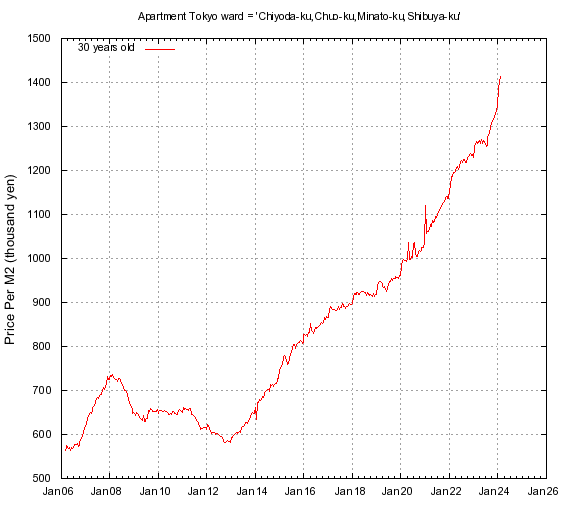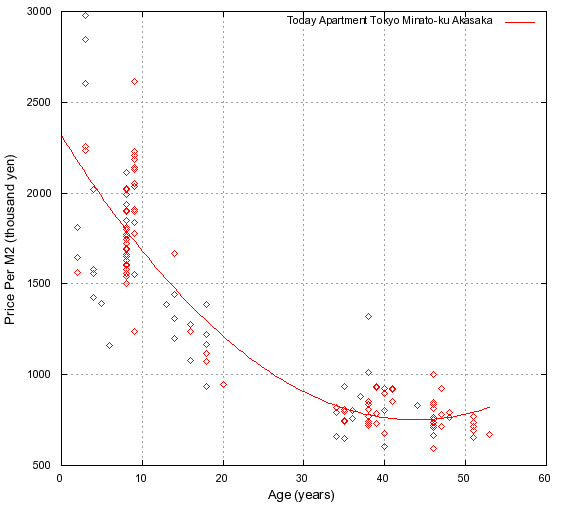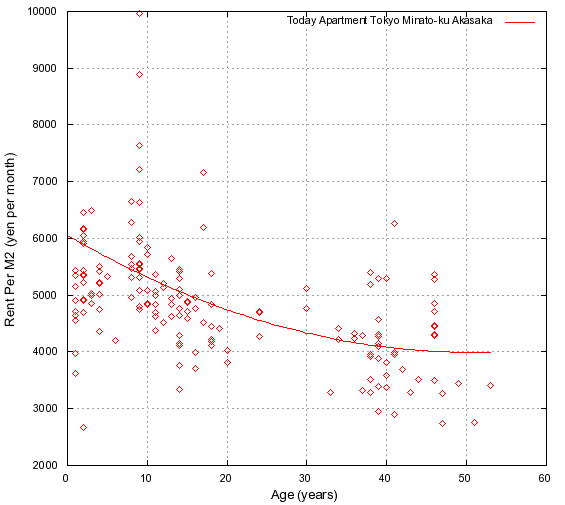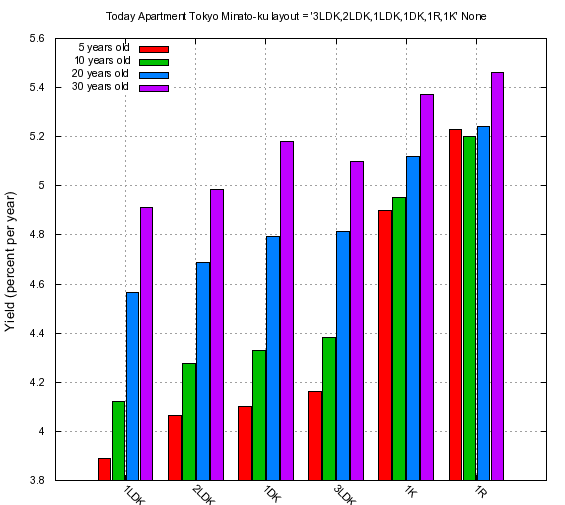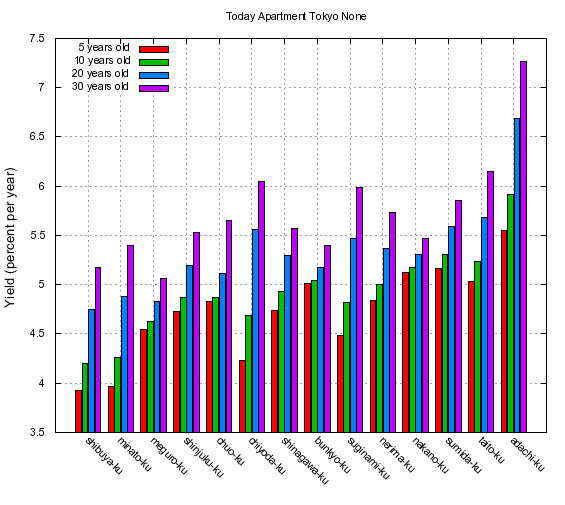Investment
This article is about investing in residential property in Tokyo with a focus on small units.
Reasons to invest in residential property in Tokyo
- High Rents / Low Interest Rates
- Strong Rule of Law
- No restrictions on foreign ownership
- Ownership rights firmly protected
- Law is Pro-Landlord
- Little protection for the renter at the end of the lease period
- Key money, cleaning fees, renewal fees
- Strong Currency
- A common misconception is that the yen is strong and possibly over-valued. Due to persistent deflation the yen can buy more and so long-term currency comparisons should be corrected for inflation. Have a look here for an inflation corrected chart of the yen.
- The US, UK and Europe are printing excessive amounts of money which increases the long-term risk of inflation that would lead to devaluation of their currencies.
- Also Japan has a current account surplus, low individual debt levels and the government debt is entirely domestically financed
- Demographics
- Even though the population of Japan will decline, with so many people moving to Tokyo, the population in the capital is still increasing. The biggest change though is the decreasing family size and aging population. More and more people are living alone, with seniors the fastest growing group. This segment is projected to grow for another 20 years. However most new apartments that are built are larger properties suitable for families with children. This means that we expect a continuous strong rental demand for very small units.
- Good Timing
- Prices went up in 2006 and 2007. During the financial crisis in 2008 prices declined. Prices finally stabilized in the summer of 2009 and started slowly increasing after that. The earthquake in March 2011 caused prices in the center to fall again. However as of beginning 2012 prices seem to have stabilized. Overall the market is down 80-85% since 1990.
What to Buy
Prefer old apartments
The advantages of older apartments are:
- Higher rental yield
- Lower depreciation
- No earthquake risk as all the value is in the land
Depreciation is brutal. After 30-35 years a building is worthless. There is very little for sale between 1984 and 1995.
Rents for older apartments are also lower.
But rents drop only about 30%, while prices drop 60%. So rental yields for older places are higher
The earthquake standards were upgraded in 1981, so if there is a chance that you will live there yourself avoid buildings that are much older.
Small apartments have higher yield
Look outside the Center
Rental yields are significantly higher outside the center. But avoid going outside the 23 wards of Tokyo. Not only is the population in the countryside rapidly declining, but also local real estate agents tend to have a near-monopoly in the smaller towns. As a result there is not a lot of transparency and it is hard to find out what a good price is. Also you would have to rely on that same broker to find renters. That put you at a disadvantage if that broker or his friends own property in the town as well. In Tokyo there are many brokers and the competition will ensure a decent level of service.
Prefer apartments with an existing renter
A property with a renter is called ‘Owner Change’ in Japan.
The advantages of buying a property with a renter are:
- No need to search for a renter. You start collecting rent from the day you get the keys.
- They are cheaper. For small studio apartments the price difference is very small, but for a 3LDK the difference can be as much as 25%.
- Many buyers are looking for a residence for themselves and thus are not interested in a rented apartment.
- Japanese banks are reluctant to finance investment apartments, which means there is significantly less money chasing rented apartments.
- You receive the deposit from the seller.
However, you can not see inside. Sometimes there are pictures available and sellers are generally honest about the condition.
Ordinary apartments are easy to rent out and to sell
Ordinary apartments are easier to rent out or sell than unique apartments. It is a common misconception that an especially beautiful, centrally located and new apartment is easy to rent out. In general such apartments are significantly more expensive and as such there are only few people that can afford such a place. It is much better to invest in ordinary apartments, such as apartments in large buildings with many similar units. As there is a big market for such units there are always people offering and looking for such units. This means it is easy to establish the market price at which such an apartment attracts a renter or a buyer quickly. Some areas might not have many very large buildings, but always prefer to invest in what is common for the area.
Pitfalls
When buying a property watch out for the following issues:
Land Issues
- Poor Road Access
- The larger the road the more valuable the land is. Also the length of the frontage with the road has a large impact. If the frontage is less than 2 meters normally you are not allowed to rebuild the property and the land is essentially only worth something for the neighbors. If they are not buying it, you certainly shouldn't.
- Setback
- Most small roads in Tokyo are being widened. If land lies on such a road it might be necessary to give up a piece of the land for this purpose. Normally this happens when applying for a new building permit, but occasionally small slices of land are used for road widening without tearing down a building. As the land is made smaller an existing building suddenly might now be larger than officially allowed according to the zoning regulation. This can lead to confusion during the purchase and mortgage application as the seller needs to proof that the building originally was built according to the zoning laws. Not everybody has the appropriate documentation.
- Rezoning
- Sometimes land has been rezoned, often reducing the floorspace that can be built. As a result existing buildings afterward are technically illegal and an owner will need to proof that the original building permit was legal.
Building Issues
- Post Construction Inspection Certificate
- This certificate proofs that a building was legal according to the zoning laws when it was built. Often for older buildings the sellers do not have this document, but we can often find it at the local government office. Normally this document is needed when applying for a mortgage.
- Union Fund
- Also called sinking fund, this money is held by the union of owners in reserve for any future maintenance. It is important that a building is reasonably capitalized to pay for the necessary upkeep and refurbishment. The biggest expense often is the elevator so prefer buildings without an elevator or where the elevator is relatively new.
- Maintenance Costs
- The building maintenance costs are used for the regular monthly expenses such as cleaning and utilities for the common spaces. The monthly amount payable varies wildly among buildings. If a building owns parking spaces extra income can be had from renting these out and in such cases the maintenance fee might be lower.
- Artificially Inflated Rents
- Occasionally you might find an apartment with a very high rental yield. Always compare if the current rent is close to the market rent. Rents have dropped significantly over the years and so a long-term renter might be overpaying. If such a renter leaves the new owner might have to drop the rent drastically to attract a new renter.
- Cemeteries, red light districts and suicides
- A property next to a cemetery is much cheaper as the Japanese are not comfortable in such places. Also if a suicide has happened in the apartment most Japanese would not want to live there. There are no clear rules about informing prospective buyers or tenants about such conditions, but commonly any suicides in the last 2 years or by a previous tenant are mentioned. Often on inquiry with the doorman or maintenance people you can find out events that happened even decades ago. It can be advantageous to purchase such units and rent them out to foreigners who are normally much less worried about these things. Unfortunately such conditions are not properly advertised.
Contract Issues
The way business is done in Japan is different from many other countries. Even though rule of law is very strong in Japan it is unusual to go to court. This process is expensive and quite time consuming. Culturally the Japanese prefer to resolve their conflicts through direct mediation to avoid nasty confrontations. And so you should see a contract in Japan as a declaration of intention and disclosure document.There is no need to get overly suspicious about the details and instead be extra careful that you manage the expectations the other party might have. In Japan business is done based on trust. Leading someone to believe that you will do something will lead to an obligation even though it might not be in writing.
Leaseholds
A leasehold is a building that has been constructed on land that belongs to someone else. It is possible to buy such a structure and take over the lease of the land. In Japan often the owner of the land is a temple or shrine. Each leasehold is different and leases are commonly for periods between 20 and 50 years and are automatically renewed. The monthly charges are low and often comparable with the real estate tax on land. The renewal fees are hefty though, often up to 5 to 10% of the value of the property. Also many lease contracts have other restrictions. For example the owner of the land has to agree with any construction and could require a substantial gift before giving approval. Also a percentage of the proceeds of a sale might be required to transfer the lease to a new building owner.
The biggest obstacle to purchasing a leasehold is that banks are reluctant to lend against it as there is no collateral. And as each lease contract is different and confidential it is impossible to compare prices for leaseholds. Even though leaseholds are 20 to 40% cheaper it is therefore best to stay away from these types of property. The only reason to buy a leasehold would be that you have the cash and you really would like to live for a long time in a particular neighborhood.
Foreclosures
The reasons I discourage anyone from buying a foreclosure in Japan are as follows:
- Bankruptcy is a big shame in Japan, so the family normally helps out and foreclosures are very rare. In Japan most financial problems get solved behind closed doors.
- The foreclosures that do get executed in general are caused by a combination of addiction (gambling, alcohol), mental disease (Alzheimer) and mafia involvement (Yakuza). Often the family has long ago disowned the seller.
- The foreclosure process is very long (over 2 years) in which time often the yakuza has moved into the property. This means that when you buy a property from the court there is a big chance that it has an unlawful (and possibly violent) tenant. It is also possible that the original owner is still there with nowhere else to go.
- As many foreigners do not understand the distinction between foreclosures in Japan and their own country they tend to have an interest in the limited amount of foreclosures in Japan. This results in bid prices that are higher than market value (the so-called winner's curse).
- Only foreclosures in the countryside can be interesting, but realize that most villagers will look at a buyer of a foreclosure as a vulture. It requires significant commitment to the local community to make a successful purchase. One guy who pulled this off is Beau Retallick. He brought bungy jumping to Japan and after a lot of research through a foreclosure bought a hotel in Minakami called Yubiso Sansou.
Demolition of older buildings
There is this myth that buildings in Tokyo have a certain lifespan and after that get demolished. The reality is that it is very difficult to demolish a building as the approval of 80% of the owners is needed. This very rarely happens even though often the land value is greater than the market value of all the units combined. Instead the union of owners routinely vote to refurbish. In some rare cases a developer will come in and make a bid on all the units in the building. Normally such a bid is a choice between a replacement unit in the new building at a discount or a cash offer and will be contingent on all the owners accepting it.
